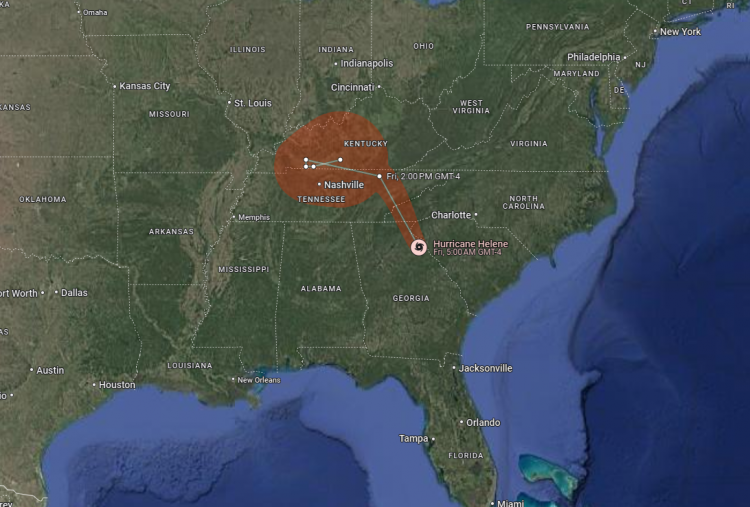Hurricane Helene, one of the most powerful storms to strike the U.S., roared through Florida and Georgia on Friday, causing widespread destruction and leaving more than 2 million homes and businesses without power. The Category 4 storm made landfall near the Aucilla River in Florida's Big Bend area late Thursday night, packing winds of up to 140 mph. Its destructive force left neighborhoods flooded, trees uprooted, and cars stranded as it moved inland, eventually weakening to a tropical storm as it passed through Georgia.
Helene is now considered one of the 14 most powerful hurricanes ever to hit the U.S., and the seventh strongest in Florida's history, according to the National Hurricane Center (NHC). Despite the storm's eventual downgrade, it continued to cause life-threatening surges and heavy rainfall, forcing emergency evacuations and rescue operations throughout the region.
Fatalities and Power Outages
Florida Governor Ron DeSantis confirmed one death as a result of the storm, when debris struck a driver's vehicle. However, he warned that the death toll could rise as rescue teams assess the damage. "When we wake up tomorrow morning, the chances are there will likely have been more fatalities," said DeSantis during a news conference late Thursday. In addition to the one confirmed death, at least five storm-related fatalities have been reported in Georgia and North Carolina, including three from a possible tornado.
More than 1.2 million people in Florida and 800,000 in Georgia experienced power outages, according to utility companies. The outages extended further inland as the storm moved north, leaving more than 927,000 homes in the Carolinas without power. Restoration efforts are expected to take days, if not weeks, to fully repair the damage caused by the storm.
Damage and Rescue Efforts
Helene brought catastrophic flooding to many low-lying areas, including parts of Pinellas County, where residents experienced a storm surge reminiscent of last year's Hurricane Idalia. Videos and images showed swamped beachside roads, submerged cars, and boats tossed around by the violent waves. In some areas, the storm dumped up to 20 inches of rain, triggering flash floods and mudslides.
In Taylor County, Florida, the sheriff's office issued a grim warning for residents who had refused to evacuate, advising them to write their names and dates of birth on their arms with permanent ink "so that you can be identified and family notified." The warning came as emergency personnel scrambled to rescue residents trapped in flooded homes, particularly in communities near Perry and Citrus County.
Georgia faced similar devastation, particularly in rural areas, where cotton and pecan crops were vulnerable at the height of the harvesting season. "This is one of the biggest storms we've ever had," Georgia Governor Brian Kemp said. Curfews were imposed in several counties, including Thomas County, where conditions remained hazardous due to lingering winds and rain.
Insurance and Economic Impact
Early estimates from reinsurance broker Gallagher Re suggest that Helene could result in private insurance losses between $3 billion and $6 billion, with an additional $1 billion in potential losses to federal insurance programs. Energy facilities along the U.S. Gulf Coast were forced to scale back operations and evacuate production sites, adding to the economic disruption caused by the storm.
In addition to property damage, the storm's impact on transportation and infrastructure has been severe. Airports in major cities such as Tampa, Tallahassee, and St. Petersburg shut down, while widespread cancellations rippled across the region. Ports and key shipping channels were also closed temporarily as officials assessed the damage.
Ongoing Threats and Recovery Efforts
As Helene weakened, the NHC downgraded the storm to a tropical depression, but warned that the threat of further flooding and landslides remained high, especially in mountainous areas of the Appalachian region. Forecasters expect Tennessee, Kentucky, and other inland states to experience heavy rainfall, with potential flash flooding and mudslides as the storm moves northward.
The Federal Emergency Management Agency (FEMA) is coordinating rescue and recovery efforts in Florida, with FEMA Director Deanne Criswell scheduled to visit the state to assess the damage. "We're going to see significant flooding, downed power lines, and destroyed homes," Criswell said during a briefing at the White House. "Our priority right now is to ensure that we save lives and support communities as they begin to recover."
Helene is the eighth named storm of the 2024 Atlantic hurricane season, which has been marked by record-high ocean temperatures. The National Oceanic and Atmospheric Administration (NOAA) had predicted an above-average hurricane season, warning that warmer waters could fuel more powerful and frequent storms.




